Maggie Craig's Blog: Maggie Craig Scottish Writer
August 2, 2025
Online Talk by Maggie

Join me online on the above date to hear about the bravery of Isabel Haldane, wife of Charles Stewart of Ardsheal in Appin. When he was hiding near their home after the Jacobite defeat at Culloden, he was hunted by Caroline Frederick Scott, Redcoat commander of the Government garrison at Fort William. Scott persecuted Isabel and wrecked their home. With her young children around her and expecting another baby, Isabel bravely stood up to him.
My talk is free but ticketed. Click here for more details and to book your place.
April 13, 2025
Book Signing at Culloden 19th April 2025
Next Saturday, 19th April, sees the annual commemoration of the Battle of Culloden. After the ceremonial procession out to the Cairn, I’ll be signing copies of Damn Rebel Bitches: The Women of the ’45 and Bare-arsed Banditti: The Men of the ’45 in the NTS Visitor centre for anyone who might be interested. Or just stop by to say hello. I’m looking forward to meeting friends old and new.
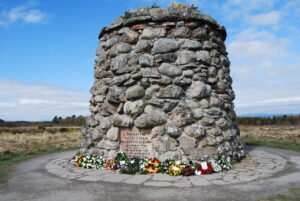
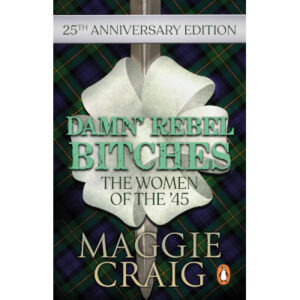

September 26, 2024
New Audio Book
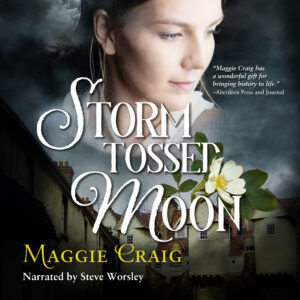
Today I’m celebrating the release of the audio book of Storm Tossed Moon, the third volume in my Storm over Scotland series.
Like the previous two books, it’s read by the inimitable Mr Steve Worsley, who is brilliant at giving each character a distinctive voice.
If you click on PREVIEW under the book cover on Amazon, you can hear the first few minutes of the story.
September 12, 2024
Ness Book Fest 2024 Author Event
As part of Ness Book Fest 2024, I’ll be speaking at Inverness Library on Saturday 28th September at 11 am. I’ll be talking about three of my non-fiction books: Damn’ Rebel Bitches: The Women of the ’45, Bare-arsed Banditti: The Men of the ’45 and One Week in April: The Scottish Radicals of 1820.
The theme of this year’s NBF is AMBITION. I’ll be looking at the differing ambitions of the Jacobites of 1745 and the Scottish Radicals of 1820.
The event is free but ticketed. You can get tickets here.
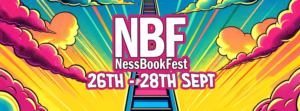
March 13, 2024
The Clydebank Blitz March 1941
The 13th and 14th March sees the anniversary of the devastating Clydebank Blitz of World War 2. Almost 250 bombers of the Nazi German Luftwaffe pounded the Clydeside town for two nights in a row. Their targets were the shipyards, the oil depots and the munitions factories, one of the latter in the giant Singer Sewing Machine factory, which had been turned over to munitions for the duration.
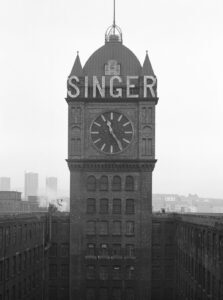 Clock Tower of Singer Sewing Machine Factory in Clydebank, Scotland.
Clock Tower of Singer Sewing Machine Factory in Clydebank, Scotland.The clock tower survived the bombs, only to be demolished after the war. The Luftwaffe bombers also hit the distillery at Yoker, on the eastern edge of Clydebank, leading to the sweet smell of whisky rising up over the town.
The people of Clydebank lived in their tenement houses cheek-by-jowl with all the industry and casualties were high. Over 1,000 were killed and the same number wounded. Hundreds more were made homeless. Only seven buildings in the town remained unscathed.
A poignant photograph shows a family who had survived leaving their wrecked home to find shelter elsewhere.
 Leaving Radnor Street, March 1941. (Courtesy of Clydebank Library)
Leaving Radnor Street, March 1941. (Courtesy of Clydebank Library)
Growing up as part of the post-war generation, I heard my parents and other relatives telling their stories of the Blitz. My father was a railway shunter in Rothesay Dock, on the night shift. He and his workmate sheltered under a railway goods wagon. My mother, expecting my elder brother, was in their rented rooms on Great Western Road up in Glasgow’s West End. She took refuge in the crypt of the nearby Kelvinside Parish Church, now arts and entertainment venue Oran Mor.
Later on, I was lucky enough to meet other Bankies who had vivid memories of those terrible nights. One young woman couldn’t hold a cup and saucer for weeks afterwards without them rattling, still suffering from the shock. One man could only repeat “It was terrible, it was terrible,” over and over again.
One young man I interviewed as an old man told me how he was an apprentice at Singer’s, coming home from a night class in Glasgow at what is now the University of Strathclyde. He wasn’t too worried when the air raid siren howled out its banshee wail just after 9 pm. There had been lots of false alarms, so much so that the factory regularly ran a sweepstake on when the siren would go off on any particular night. On the 13th March 1941, it was for real.
Other stories are told in IMM MacPhail’s The Clydebank Blitz. This being Clydebank, like Glasgow a town full of comedians, there were funny stories in among the tragedy. One man was blown off his feet and came to surrounded by packets of tea. And yes, he helped himself to a few!
I first wrote the story up as fiction, works of research and imagination, in When the Lights Come on Again. My heroine Liz is a nurse who falls in love with Mario Rossi, a medical student who helps his father run the family cafe near the University of Glasgow. Heartache is in store when Italy enters the war on the German side and Winston Churchill gives the order to intern all the Italians living in Britain. Read more about that here.
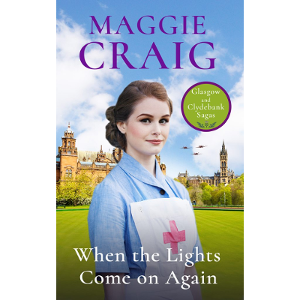
The Clydebank Blitz also has a chapter in my non-fiction book: When the Clyde Ran Red: A Social History of Red Clydeside. This gave me the opportunity to relate the true stories so many people had told me.
November 23, 2023
Storm Tossed Moon Online Launch
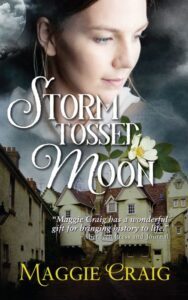
Where: Online/YouTube
When: Thursday 23rd November 2023 at 1.30 pm. Video available to watch any time after that.
Just click here:
There will be cake. Well, virtual Victoria sponge anyway. Hope you can join me!


September 8, 2023
John Cairney 1930-2023
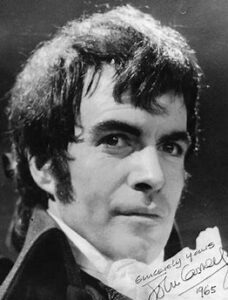
John Cairney as Robert Burns
John Cairney was a charismatic Scottish actor, forever identified with his passionate and powerful portrayal of Robert Burns in his one man show, There Was a Man.
I met him once, back in 1997, when we were both waiting for our respective editors at Mainstream Publishing in Edinburgh. He was warm, friendly and charming. I told him our family had also loved the 1960s TV series in which he starred as a rector/heidie of a Scottish high school, This Man Craig.
He told me he’d recently flown back to Scotland from New Zealand, where he lived for a number of years. When he stepped into a taxi at Glasgow Airport, the driver recognized him. The conversation went like this:
“John Cairney? I thought you were deid!’
“No, I’ve been living in New Zealand.”
“Same thing!”
Apologies to New Zealand but he thought it was hilarious! In my mind’s eye, I can still see him laughing at this typical Glasgow exchange.
May 26, 2023
Talk & Book Signing at Highland Folk Museum
I’ll be giving a talk and (hopefully!) signing some books at Highland Folk Museum’s upcoming Outlander Day.
I’ll be sharing some stories from the medical history of the ’45, specifically the tale of the Scottish Jacobite doctor who became an American hero.
Saturday 10th June at 12 noon.


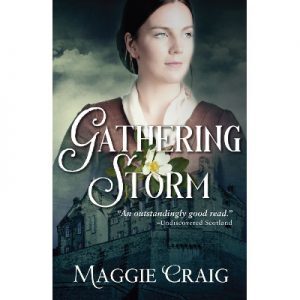
November 26, 2022
Curses! On Swearing in Historical Novels
(This article was first published in the Summer 2022 edition of The Author, the journal of the Society of Authors.)
 Snoopy Cursing the Red Baron
Snoopy Cursing the Red Baron
‘Maggie Craig! Your language!’ Although I didn’t entirely buy my cousin’s wide-eyed look of shock, I told her it wasn’t my language, it was the characters’ language. If you’re an early 19th century graverobber in old Edinburgh, I don’t think you’re going to say, ‘Oh, drat,’ when you’re disturbed in your midnight work in Greyfriars Kirkyard by a breathless warning from your lookout boy that the constables are on their way.
Likewise, if you’re a Redcoat officer in mid-18th century Edinburgh in pursuit of Jacobite plotters. When your quarry escapes, you’re unlikely to slap your hand against the wall, the words ‘Oh, bother,’ tripping off your tongue. The hero in my Storm over Scotland series is a trooper and he swears like one.
I don’t think I’ve overdone it. Sometimes my Redcoat captain simply ‘mutters a string of curses’. Even when his war wound from Dettingen is playing up. He took a musket ball in the thigh there. Fired, as he puts it, ‘by some misbegotten French bastard.’
I’m old enough to remember when that word was truly shocking. I think it was Callan, a 1960s tv series about a world-weary MI5 agent starring Edward Woodward, which normalised it. Now it can be used almost affectionately. Tolerance changes over time. Take the f-word. It’s widely used on the Internet. Although it’s not yet completely acceptable in other public discourse such as newspapers, I see it creeping in there too.
As part of what we might call industrial language, it’s been swirling around for centuries, in shipyards, the army and other male-dominated workplaces. Travelling down by train from Aberdeen during a very snowy winter a few years back, I sat across the aisle from two men who’d clearly come off one of the rigs. They swore their heads off the whole way. Every second word.
The sparkling snowy scenery on the other side of the window caught their attention, glistening white across the plain and covering Fife’s Lomond hills. ‘Beautiful, int it?’ asked one. His pal heaved a sigh of pleasure. ‘Aye. God’s f***ing country.’
I feel my 18th century Redcoat wouldn’t be authentic if he didn’t sometimes curse. It’s taken me aback how offended some readers are by swearing, to the extent that it colours their whole view of the book. One reader in the UK wrote that she was disappointed by the ‘foul language’ and had put my book in the bin.
I’m glad she didn’t read on to find the one instance in this book of the c-word. She might have turned a flamethrower on my poor novel. That word didn’t come out of my mouth. My hero uses it to show his contempt for the young woman he’s interrogating. He gets his comeuppance when he later falls in love with her.
One American reader of the same book found the ‘modern day profanities mixed with Scottish dialect unsettling.’ I wondered if she thought people in Scotland in the past skipped through an endless Brigadoon and that swearing was a purely modern phenomenon.
Another reader queried whether the f-word was used in the 18th century. Yes. It was. It probably goes back to the Middle Ages. In Scotland, an early record of its use was in the 1500s, in playwright Sir David Lindsay’s Ane Pleasant Satyre of the Three Estaits. The play was revived at the 1948 Edinburgh Festival, and subsequently.
Another US reader found my novel set in 19th century Edinburgh, ‘harsh and not clean.’ She objected both to the graverobber’s swearing and to the sex scenes. As I’ve discovered, there are various categories in American genre romance. At one end of the spectrum, there’s erotic, passionate, steamy. At the other end you find Christian romance and Sweet and Clean romance. Swearing is a no-no, as are love scenes which go beyond kissing. Sometimes I wonder how these people manage to reproduce.
I’ve seen one romantic novel advertised recently as ‘No steam.’ To which the appropriate answer might be that short, sharp four-letter word. Out of interest, I read a Christian romance. Set in the American backwoods in the 19th century, it’s well-written and the love story is indeed sweet and tender. What unsettled me was how the lovers bond over their mutual appreciation of the hero’s lethal hunting rifle.
I find it sad that some people only want to read books which don’t challenge their world view. I fully accept their right to do so but strongly object to how they clearly see themselves as occupying the moral high ground. Sometimes I long to grab these self-appointed moral arbiters by their metaphorical lapels and challenge their self-righteous prejudices.
‘How dare you reduce this book into which I poured my heart and my soul, not to mention my extensive research, as ‘not clean’? How dare you blithely state that you put my book in the bin because you were offended by a few swear words? Don’t you think it’s pathetically judgmental to describe a passionate love story as ‘steamy’?
Ah, well. A writer can dream. Better to mutter a string of curses and move on.
August 24, 2022
No upcoming events to report at the moment.
No upcoming events to report at the moment.



